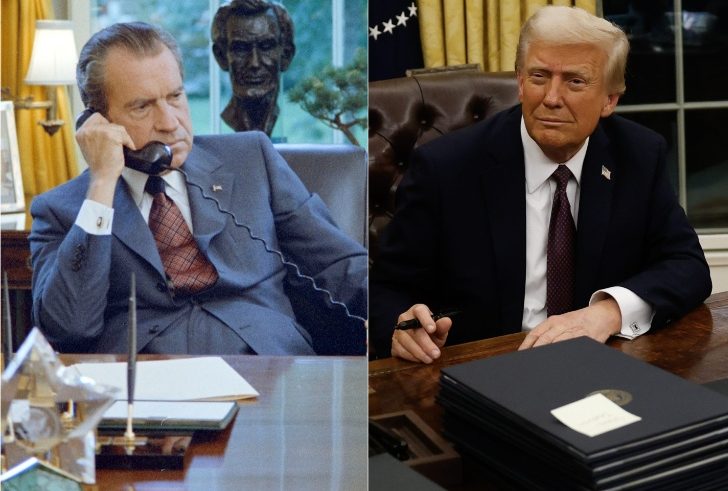President Trump. Now More Than Ever?

Most presidents want to start with a bang. Donald Trump is looking to outdo them all. Over the weekend, the administration made important progress in the Western Hemisphere, bringing hostages back from Venezuela and driving Panama out of China’s Belt and Road Initiative. On Monday, Mexico and Canada barely avoided hefty tariffs by launching new border security initiatives. Trump then sent Elon Musk to launch a hostile takeover of the United States Agency for International Development, restarted the maximum pressure campaign on Iran, and, flanked by Benjamin Netanyahu, announced his plan to seize and rebuild Gaza.
Not for the first time, Trump has astonished and confused friends and foes alike. Just weeks ago he denounced the Biden administration for giving “unlimited funding to the defense of foreign borders.” Now, he is talking about making Canada the 51st state and adding Gaza, Greenland, and the Panama Canal to America’s overseas possessions. America seems to be contracting its international commitments while also expanding.
Trump is not, however, the first president to befuddle observers by talking about retrenchment and acting boldly: Although they hail from the opposite sides of the country and grew up in very different circumstances, Trump is walking in Richard Nixon’s path.
During his inauguration, Trump warned, “Our government confronts a crisis of trust,” in part because it has been “stumbling into a continuing catalogue of catastrophic events abroad.” Marco Rubio then laid out his view of the geopolitical situation shortly thereafter in his first interview as secretary of state. “At the end of the Cold War,” he said, “we were the only power in the world, and so we assumed this responsibility of sort of becoming the global government in many cases, trying to solve every problem.” That is an “anomaly,” and “eventually you were going to reach back to a point where you had a multipolar world, multi-great powers in different parts of the planet. We face that now.”
Nixon thought the same way when he returned to government after eight years in exile. As he reported to Congress, other countries had recovered from the ravages of World War II, and the United States no longer dominated world affairs. “The central thesis” of his Nixon Doctrine was “that the United States will participate in the defense and development of allies and friends, but that America cannot—and will not—conceive all the plans, design all the programs, execute all the decisions and undertake all the defense of the free nations of the world.”
That said, Nixon was not resigned to “fall into [the] dry rot of just managing the chaos better.” Inspired by the Apollo 11 landing, he told his staffers to “never be indecisive, get going, take risks, be exciting … go for broke.” Only through bold action could the United States not “go down the drain as a great power.” As the U.S. Army pursued the Vietnamese Communists into Cambodia, he admonished his foreign policy team, “You have to electrify people with bold decisions. Bold decisions make history, like Teddy Roosevelt charging up San Juan Hill.” During his presidency, Nixon ended the gold standard, opened relations with China, launched maximum pressure bombing campaigns in Vietnam, and expelled the Soviets from the Middle East with Israel’s help.
Trump and Nixon are very different people—one a hyper-energetic teetotaler, the other a saturnine fan of the bottle—but they share some instincts and interests. The moon landing fascinated Nixon, and Trump recently announced, “We will pursue our manifest destiny into the stars, launching American astronauts to plant the Stars and Stripes on the planet Mars.” Trump is similarly interested in devaluing the dollar, shrinking trade deficits, and taking bold action abroad—as foreign leaders from Copenhagen to Cairo are rediscovering.
Nixon rolled the dice plenty, and his Cambodia operation failed, but he often avoided snake eyes because of his deputy Henry Kissinger, who was less of a gambler than a shrewd analyst of power. Together, they reshaped America’s global position so the country could survive Jimmy Carter’s follies and bounce back under Ronald Reagan. Trump’s staffers are filling his administration with appointees who are ideologically devoted to a much more rigid and inert policy than his own though. He will have to work hard to avoid being boxed in or undermined.
Trump promised that “America will soon be greater, stronger, and far more exceptional than ever before,” and that “our power will stop all wars and bring a new spirit of unity to a world that has been angry, violent, and totally unpredictable.” Roosevelt took San Juan Hill with the aid of his Rough Riders. Nixon had Kissinger. Donald Trump needs his own team.












